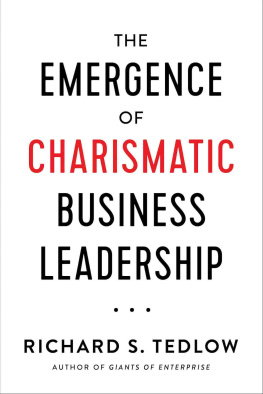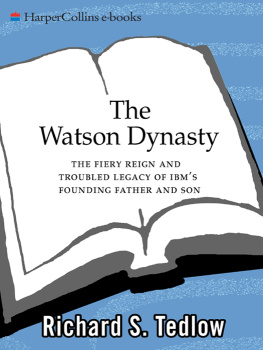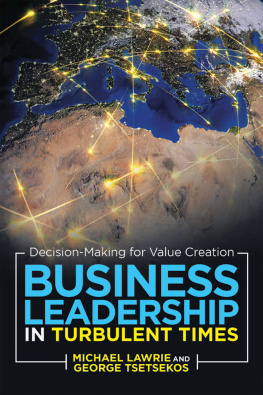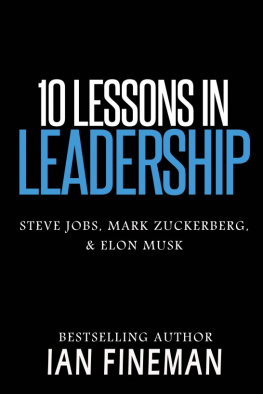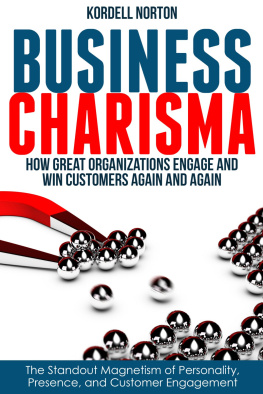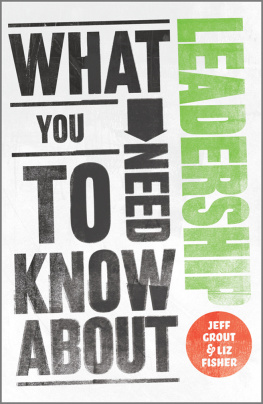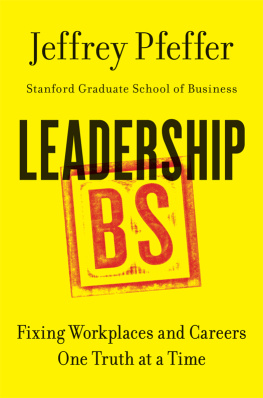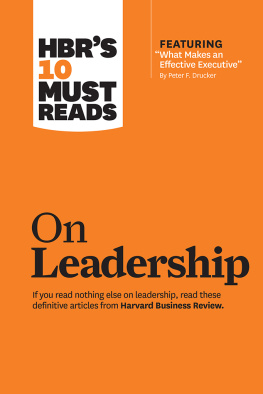Contents
Guide


The Emergence of Charismatic Business Leadership
Copyright 2021 by Richard S. Tedlow
All rights reserved. No part of this book may be used or reproduced in any form or by any electronic or mechanical means, including information storage and retrieval systems, without permission in writing from the publisher. For information, please contact RosettaBooks at
.
First edition published 2021 by RosettaBooks
Cover design by Mimi Bark
Interior design by Alexia Garaventa
ISBN-13 (print): 978-1-9481-2284-9
ISBN-13 (ebook): 978-0-7953-5310-9
Library of Congress Cataloging-in-Publication Data:
Names: Tedlow, Richard S., author.
Title: The emergence of charismatic business leadership / Richard S. Tedlow.
Description: New York : RosettaBooks, 2021.
Includes bibliographical references and index.
Identifiers: LCCN 2021021443 (print) | LCCN 2021021444 (ebook)
ISBN 9781948122849 (hardcover) | ISBN 9780795353109 (ebook)
Subjects: LCSH: Leadership--United States--Case studies.
Management--Technological innovations
Strategic planning--United States--Case studies.
Success in business--United States--Case studies.
Classification: LCC HD57.7 .T435 2021 (print)
LCC HD57.7 (ebook) | DDC658.4/092--dc23
www.RosettaBooks.com

This book is dedicated to my wonderful wife, Donna M. Staton, MD, MPH. Donna is a sweet and loving soul with a passion for global child health and the environment. She is an inspiration in her devotion to those less fortunate than we in Americas middle class.
PART I

The Great Transformation
In the years following World War II, the biggest American businesses were faceless bureaucracies. This characteristic is captured by their names: General Motors, Standard Oil, United States Steel, and so forth. If I told you the names of the chief executive officers of these firms in, say, 1955, you would not recognize them. Indeed, few people in 1955 knew who they were. I choose 1955 because Time magazine selected the CEO of General Motors as its Man of the Year then. He was chosen because of the position he held, not because of the person he was. The job had a man rather than the man having a job.
In 1956, William H.
The contrast to our world today could not be more striking. The names of large companies now often have personality: Amazon, Apple, Facebook, etc. The names of the people who are leading or who have recently led these corporations are known all over the country and indeed the world: Bezos, Jobs, Zuckerberg. The shunning of genius and the celebration of the average are inconceivable at these companies.
This great transformation has been essential in order to sustain the vibrancy of the American business world. Why has it taken place? What made it possible? An important part of the answer to these questions is the rise of charismatic business leadership.
There were charismatic business leaders in the 1950s and 1960s, just as there are CEOs today who are not charismatic. We are describing a general tendency away from the CEO as the chief mechanic of the business who kept the wheels of the company turning while working out of the public gaze to the CEO as a man or woman with a mixture of charm, guile, brilliance, and cruelty who remakes the industry and in some cases society as a whole and in the process becomes a celebrity.
What is charisma? It is a mercurial word for a mercurial concept. By looking at leaders who have it and those who do not, we will try to encapsulate its meaning. We will begin with Steve Jobs, who is invariably described as charismatic without that adjective ever being defined.
Chapter 1

Steve Jobs, a Life in Three Acts Act One: End and Beginning
When Steve Jobs died on October 5, 2011, Apple was inundated with condolence messages from all over the United States and from around the world. Some of them were touching. Others probably were also, but one could not be certain because they arrived in such a variety of languages that it was difficult to find people who could translate them. Yet more problematic were the notes we (I worked at Apple from 2010 to 2018) received in alphabets no one could recognize.
These notes were sent not only to Apple headquarters in Cupertino, California, but to Apple retail stores around the world. The stores posted them on their windows. In addition, some people left bouquets of flowers in front of the stores. Pause to consider this. People left flowers at stores because of the death of a CEO.
No one knows how many notes were received. According to the Remembering Steve page on
After his death, California governor Jerry
Jobss death had been long anticipated. He was diagnosed with pancreatic
On June 12, 2005, Jobs delivered the commencement address at
Much has been said and written about Jobs. No one has questioned whether he could tell a story. He was a great storyteller that day at Stanford. Not everything he said was quite true, but charismatic people often get away with walking the border between reality and fantasy.
By early 2008, it was clear that his cancer had metastasized. This was a truth that could not be finessed. It was all over except the waiting. And that came to an end on October 5.
Dying from cancer is dreadful beyond words. In more than one instance, there is a denial of death until the last breath is drawn. Was this really the end? This disease had afflicted Jobs in 2003. He kept coming back.
As recently as January of 2010, he had delivered the keynote introducing yet another transformative product, the iPad. Would there be any more such products? What would happen to Apple? The company had fired Jobs on September 17, 1985. Twelve years less one day thereafterSeptember 16, 1997he came back to save Apple when it was a month or two away from bankruptcy. Only he could have done it. How would the world go on without him?
Why was the death of Jobs an event of global import? Only a tiny handful of the millions of people who sent those notes had ever met him. And although there is a legion of legends about Jobs dating back to Apples birth, he was not thought of by those who knew him or only knew of him as either nice or particularly kind. Why did all those people feel close enough to him to project their own feelings onto him? Why did they feel that he belonged to them that he was theirs?
Is it because Jobs touched so many people through his products? Is it because the products were designed with pride and beauty, thereby in a sense honoring the purchaser, in a way that the products of competitors were not? Is it because he left behind a beautiful family? Is it because he reached the height of success when his life was taken from him? Is it because he succeeded despite starting with no advantages?
Jandali has said that he wanted to marry Schieble , but her parents disapproved. Her father was dying, and she did not want to upset him. Schieble was living for a time with Jandali (the son of a wealthy man) in Homs, Syria. She left Syria for San Francisco, took up residence in a home for unwed mothers, and put her son up for adoption immediately after his birth without consulting Jandali.

